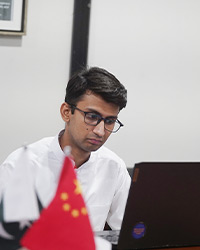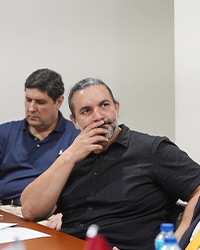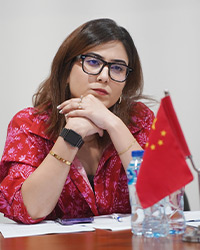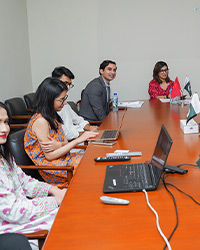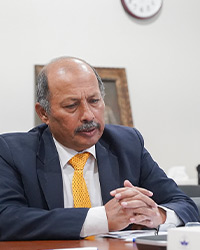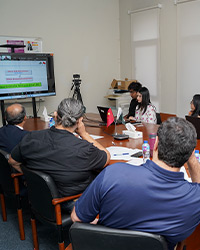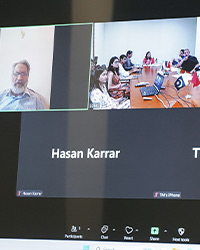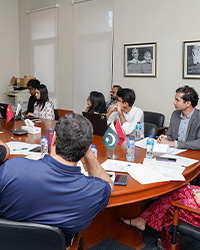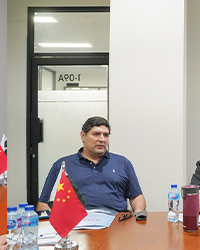Roundtable Discussion on China's Third Plenary Session and its Implications on Pak-China Relations
On August 12, 2024, Centre for Chinese Legal Studies (CCLS) at Lahore University of Management Sciences (LUMS) recently hosted a roundtable discussion on the implications of China's Third Plenary Session on Pakistan-China relations. The event brought together esteemed academics and legal experts, including Dr. Hassan Daud Butt, Former CEO BOIKP; Dr. Sheharyar Sikander Hamid, Assistant Professor of Corporate and Commercial law, LUMS; Dr. Asif Amin, Assistant Professor & Research Fellow (International Relations) at Centre for Security, Strategy and Policy Research, University of Lahore; Ambassador Mansoor Ahmad Khan, Director Beaconhouse Centre for Policy Research; Mr. Ahmed Hasan, Advocate Supreme Court of Pakistan and a former Additional Advocate General of Punjab; Dr. Hassan H. Karrar, Faculty of Humanities and Social Sciences, LUMS; Dr. Sohail Safdar, Executive Director, Social Protection Resource Centre, Former Special Secretary, Cabinet Division, Government of Pakistan; Dr. Tahir Mumtaz, ex-Director, China Study Centre, COMSATS University Islamabad, Senior Research Fellow, China Brand Center, Guangzhou, China and Ms. Hui Qi, Adjunct Faculty at Centre for Chinese Legal Studies, Lahore University of Management Sciences. The roundtable discussion covered four key theme areas, providing a comprehensive analysis of the implications of the Third Plenary Session.
In the roundtable discussion, experts delved into the impact of the Third Plenary Session of the Chinese Communist Party on the relationship between Pakistan and China. The session, a key event in China's political calendar, was scrutinized from multiple perspectives to understand its broader implications.
Firstly, the historical context and significance of the Third Plenary Session were explored. The session, a pivotal moment in China's development, marked a period of significant policy shifts and reforms. Its importance was underscored by its role in shaping China’s modern economic and political landscape. The speakers emphasized that understanding this background is crucial for grasping the full extent of the session's impact on both domestic and international fronts.
A significant portion of the conversation was dedicated to the China-Pakistan Economic Corridor (CPEC). All the experts on regional economic projects, analyzed the implications, stating, "The Third Plenary Session’s outcomes will likely influence CPEC’s trajectory, affecting both its implementation and long-term prospects. Any changes in China’s economic policies could directly impact this critical infrastructure project. This insight highlights the importance of understanding the session’s potential impact on the corridor’s development.
Ambassador Mansoor Khan highlighted the strategic significance of CPEC within China’s broader diplomatic outreach. He remarked, "One of the most important aspects of the Third Plenary Session is the emphasis on extending CPEC to other parts of the region. This move is not just about infrastructure but a key component of China’s diplomatic and economic strategy to enhance regional connectivity and influence." This statement underscores how extending CPEC aligns with China’s broader goals of regional integration and diplomatic engagement.
Dr. Safdar Sohail provided a candid assessment of the current state of China-Pakistan relations, stating, "Both countries are currently focused on small-scale projects and there is no significant appetite for revising the vision agreed upon in 2014-15. This ongoing focus on incremental changes rather than bold new initiatives characterizes the current phase of our bilateral relations." This observation points to a more conservative approach in the relationship, with both nations concentrating on refining existing projects rather than launching new, ambitious undertakings.
At the end of his presentation, Dr. Hassan Daud Butt offered a thought-provoking reflection on the practicalities of policy and implementation. He remarked, "It does not matter if a cat is black or white, as long as it catches the mice." This metaphor highlighted the importance of effective outcomes over theoretical or ideological preferences, emphasizing that the success of bilateral projects and initiatives should be judged by their practical results rather than their adherence to a specific vision or method.
Lastly, the discussion turned to the lessons that Pakistan could draw from China’s economic strategies and policies. Ms. Hui Qi, a Chinese citizen who had been living in Pakistan for 17 years now, shared her views through the lens of Chinese wisdom. She remarked, "As an old saying goes, 'Instead of giving people fish, teach them how to fish.' This means that rather than just offering immediate assistance, it is more beneficial to empower Pakistan with knowledge and strategies for sustainable economic development." Additionally, Ms. Hui Qi noted, "Another traditional wisdom states, 'The solution is always more than the problem.' This reflects the idea that challenges are opportunities for creative and multifaceted solutions, encouraging a proactive and optimistic approach to economic and governance reforms." These insights offered valuable perspectives on how Pakistan might leverage China's experiences to enhance its own economic and governance frameworks.
Overall, the roundtable provided a comprehensive overview of how the Third Plenary Session’s outcomes could reshape the relationship between Pakistan and China. By examining the historical context, economic implications, CPEC-related impacts, and actionable lessons, the discussion aimed to offer a nuanced understanding of the evolving bilateral ties and identify potential areas for future collaboration.

